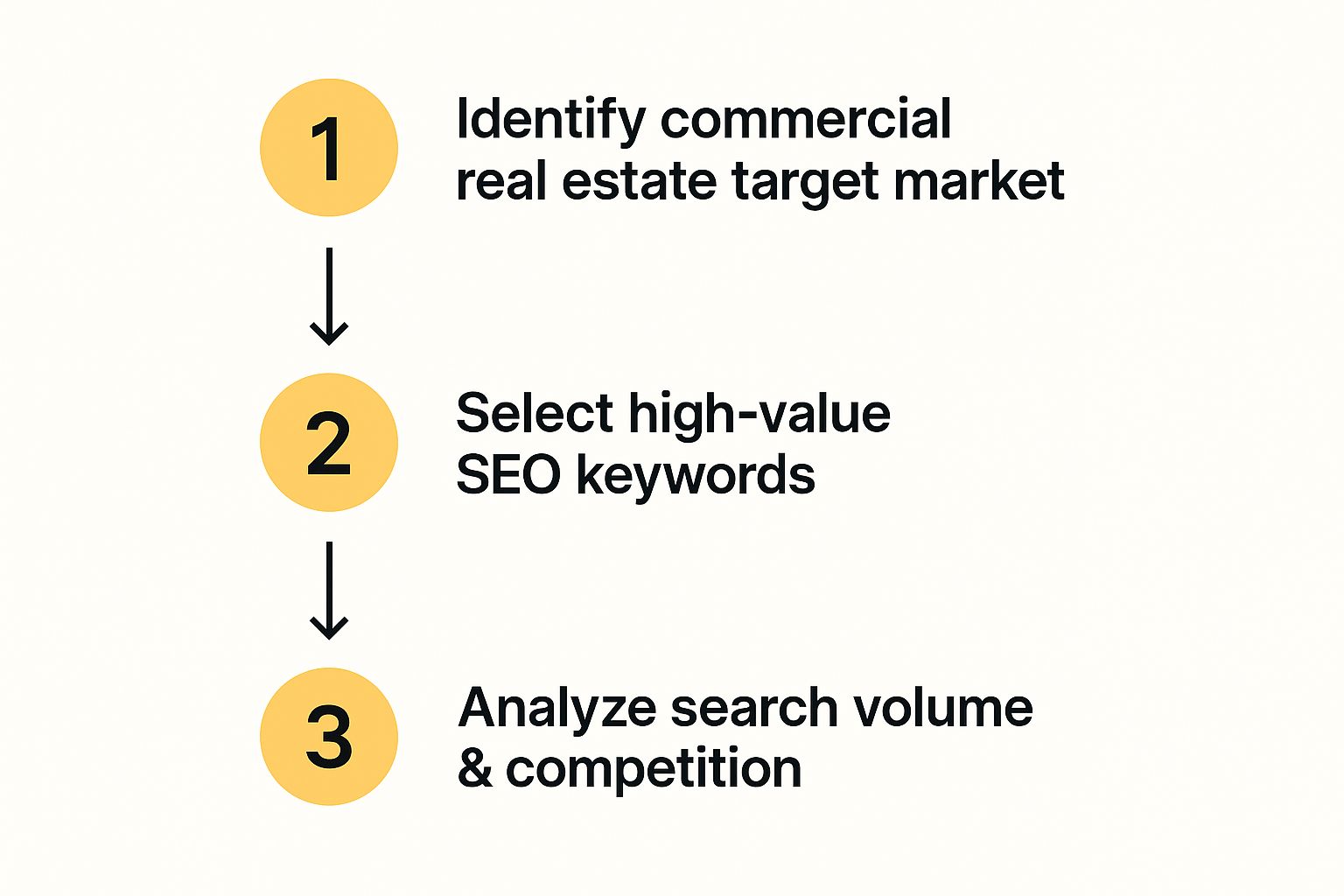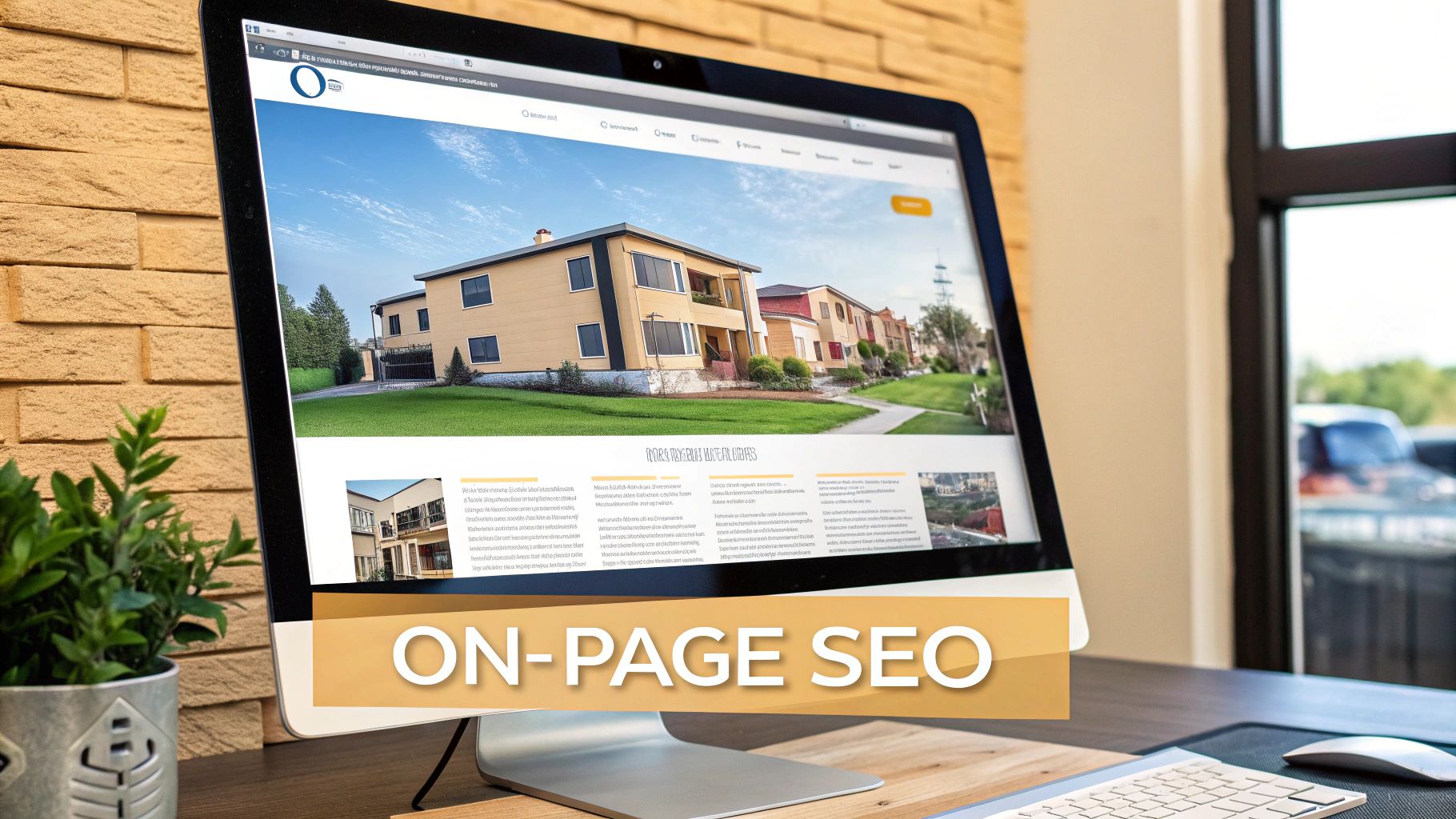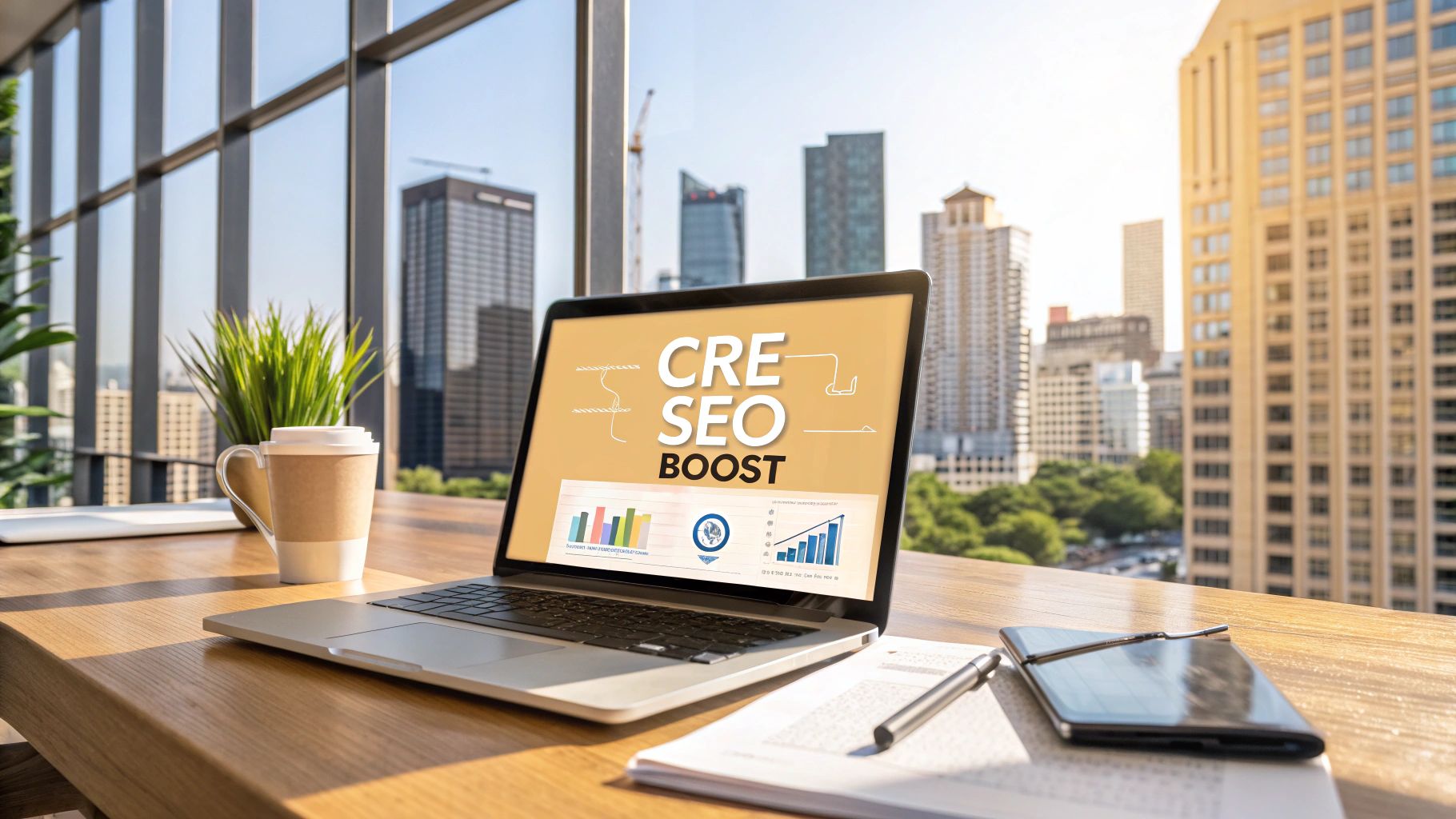When we talk about SEO for commercial real estate, we’re talking about a very specific goal: making sure your website shows up when high-value tenants and investors are hunting for properties on Google. It’s a mix of using the right keywords, making smart technical improvements to your site, and zeroing in on your local market to get your listings in front of the right people.
Why SEO Is Your Strongest CRE Marketing Asset

In the hyper-competitive world of commercial real estate, if you’re not visible online, you’re practically invisible. Your next big client isn't leafing through a directory anymore. They’re on their phone or laptop, typing things like "downtown office space for lease" or "industrial warehouse near major highway" directly into a search bar.
Those phrases are the modern-day equivalent of a high-value inbound call. This is where a sharp commercial real estate SEO strategy stops being a "nice-to-have" marketing line item and becomes a core part of your business engine.
The numbers don't lie. A well-oiled SEO plan can deliver an almost unbelievable return on investment (ROI) of 1,389% for real estate businesses. That's nearly $14 back for every dollar spent, making it one of the most powerful marketing channels you can invest in. This is all driven by a simple reality: 96% of property buyers start their journey online.
Going Beyond Buzzwords to Get Real Results
Good SEO is about more than just traffic. It’s about connecting your properties with prospects who have serious intent, right at the moment they’re looking. You're building a digital presence that answers their questions and establishes your expertise before you even have a conversation. The whole point is to attract the right kind of traffic—the decision-makers who are actively searching for exactly what you offer.
The real goal is to turn an anonymous Google search into a qualified lead. When someone organically finds your ultra-specific landing page for "life sciences lab space in San Diego," they arrive with a level of trust and interest that cold calling could never dream of matching.
To get there, we need to build a solid foundation. This guide breaks down the process into clear, actionable strategies that work. For a deeper dive into how these pieces fit together, our insights on data-driven SEO marketing are a great place to start.
Before we dive in, let's outline the core components we'll be covering. Think of these as the strategic pillars that support a dominant online presence in the CRE market.
Key SEO Pillars for Commercial Real Estate Success
| SEO Pillar | Primary Goal |
|---|---|
| Strategic Keyword Research | Uncover the exact terms your ideal clients use to find properties like yours. |
| On-Page Property Optimization | Structure your website and listings to be perfectly understood by users and search engines. |
| Technical & Site Speed SEO | Ensure your website is fast, secure, and technically sound for a better user experience and higher rankings. |
| Local Market Dominance | Use local SEO tactics to become the go-to authority in your specific geographic area. |
| Building Undeniable Authority | Create high-value content and earn backlinks that establish your credibility and trust. |
Each of these pillars is crucial. Get them right, and you’ll build a powerful, lead-generating machine for your CRE business. Let's get started.
Finding Keywords That Attract High-Value Clients
Effective SEO for commercial real estate really starts with getting inside your ideal client’s head. You have to figure out the exact phrases they’re typing into Google when they’ve got a specific, urgent need. This whole process, what we call keyword research, is less about guesswork and more about strategic investigation.
Forget generic terms like "commercial property." The real money is in long-tail keywords—those longer, more specific phrases that tell you exactly what a user is looking for. A search for "benefits of triple net lease" is one thing; that person is probably still in the research phase. But a search for "industrial warehouse lease rates Miami"? That’s a high-value prospect ready to make a deal. Your goal is to show up for that second searcher.
Uncovering Niche and Local Opportunities
First things first, brainstorm the core services you offer and the property types you specialize in. Put yourself in your client's shoes and jot down every potential search query you can think of. This isn't just about property types; it's about drilling down into specific submarkets and client needs.
- Property-Specific Keywords: Don't just say "office space." Get specific with "Class A office space for lease downtown Austin."
- Niche-Specific Keywords: If you specialize, own it. Target terms like "life science lab space for rent San Diego."
- Location-Specific Keywords: Go beyond the city and get hyperlocal. Think "retail space for lease The Galleria Houston."
This level of detail is what separates a website that gets random traffic from one that attracts highly relevant prospects who are more likely to pick up the phone.

This workflow shows it’s a deliberate process. You start by identifying your market and end with data-backed analysis—not just throwing spaghetti at the wall to see what sticks.
Using Tools and Analyzing Intent
Once you have a seed list of keyword ideas, it’s time to see if they’re actually any good and find more like them. Sure, you can find some ideas using Google's autosuggest feature, but to really compete, you need something more robust. Using leading SEO platforms like Semrush is a game-changer for finding high-value keywords and seeing what your competitors are ranking for.
These tools give you a few critical pieces of data:
- Search Volume: How many people are actually searching for a term each month?
- Keyword Difficulty: How tough will it be to crack the first page for that keyword?
Your sweet spot is finding keywords with reasonable search volume and low-to-moderate difficulty. A term like "medical office space for sale near Providence Hospital" might only get 10-20 searches per month, but I guarantee those are incredibly qualified leads.
The final, crucial step is mapping these keywords to specific pages on your website. Every high-value keyword or tight cluster of related terms needs its own dedicated page. This could be a specific property listing, a neighborhood guide, or a page focused on a single property type. This one-to-one mapping is a clear signal to search engines that your page is the absolute best result for that query, which dramatically boosts your chances of ranking and getting in front of the right clients.
Optimizing Listings That Convert Clicks to Calls

A solid seo commercial real estate strategy lives and dies by what happens after the click. Your individual property listings are the final hurdle. They're where a curious searcher decides whether or not to become a lead, so they need to be flawless—for both people and search engines.
This isn't just about sprinkling in keywords. It’s about treating every single listing like its own high-stakes landing page. Think of it as building a complete resource for that one property. Your goal is to anticipate and answer every question a potential tenant or buyer might have.
This means you need to write rich, detailed property descriptions that weave in your target keywords naturally.
For example, don't just say "large warehouse." Instead, tell a story: "This expansive 30,000 sq ft industrial warehouse offers exceptional logistics capabilities, featuring six dock-high doors and a 32-foot clear height, making it an ideal distribution center for businesses serving the greater Phoenix area." See the difference? One is a label; the other is a solution. That’s what provides real value to users and powerful context for Google.
Crafting Compelling Page Elements
Optimizing a listing goes way beyond the main description. Every single piece of that page is a chance to improve your ranking and keep users engaged. Your page titles and meta descriptions are especially critical—they're your first impression on the search results page and your only chance to earn that click.
Let's look at a quick before-and-after.
-
Before Title: Property for Lease | 123 Main St
-
After Title: For Lease: 15,000 Sq Ft Office Space in Downtown Miami, FL
-
Before Meta Description: A great commercial space is available for lease. Contact us for more details.
-
After Meta Description: Lease a premier 15,000 sq ft office in downtown Miami. Features floor-to-ceiling windows, modern amenities, and garage parking. View photos and floor plans now!
The "after" versions are specific, pack in relevant keywords, and include a clear call to action. They tell both Google and potential clients exactly what they’re going to get, which can make a huge difference in your click-through rates.
The Power of Visuals and Structure
Everyone knows high-resolution images are a must in real estate, but their SEO value often gets completely ignored. Every image file needs a descriptive name and, more importantly, descriptive alt text. This simple text helps search engines figure out what an image is about and makes your site more accessible.
- Bad Alt Text:
IMG_9875.jpg - Good Alt Text:
20000-sq-ft-office-space-for-lease-austin-tx
When you combine strategic content with optimized technical details, you create listings that do the selling for you. This focus on conversion isn't just a theory; the data backs it up. Benchmarks for 2024 show that organic search drives a respectable 3.2% conversion rate in real estate, which already beats paid ads. But well-optimized sites often see that number climb past 5%, especially when they snag top search rankings that can earn a click-through rate of nearly 40%. You can dig deeper into how these benchmarks impact real estate marketing on Promodo.com.
Remember, the ultimate goal of on-page SEO for a property listing is to reduce friction. Make it incredibly easy for a prospect to find all the information they need—from square footage and zoning to high-quality photos and virtual tours—and then provide a clear, unmissable call to action to contact you.
Dominating Your Local Market with Targeted SEO
A great website is a solid foundation, but let's be real: commercial real estate is a local game. Success isn't about getting found by everyone, everywhere. It's about being the first name that comes to mind when a high-value prospect starts looking for property right in your city. This is where a sharp, targeted local SEO strategy becomes your most powerful play.
The undisputed centerpiece of your local digital presence is your Google Business Profile (GBP). This is often the very first impression a potential client gets of your brokerage. Just claiming your profile and walking away is a huge mistake; you need to own it. This goes way beyond just listing your address and phone number.
You have to be meticulous. Choose the most accurate business categories, keep a steady flow of high-quality photos coming in (think properties, team shots, the works), and actively chase those five-star reviews from happy clients. A well-maintained, active GBP sends massive trust signals to Google, making you the obvious choice when someone searches locally.
Creating Hyper-Local Landing Pages
To truly corner the market on specific local searches, you need to build out dedicated landing pages for the individual submarkets and neighborhoods you serve. Generic, one-size-fits-all pages just don't move the needle anymore. When a prospect is looking for space in a specific business district, they expect to land on a page that speaks their language.
Think about the difference here:
- Broad Page: "Office Space for Lease in Houston"
- Hyper-Local Page: "Retail Space for Lease in The Galleria Houston"
That second option is infinitely more powerful. It aligns perfectly with what the user is actually looking for, which improves your quality score for local ads and dramatically boosts your chances of ranking for those valuable, long-tail local keywords. Each of these pages should be a deep-dive resource, packed with relevant listings, neighborhood data, and client testimonials. This is even more critical now that most property searches happen on smartphones, where targeted local strategies are proven to hook highly qualified leads. You can get more details on how these tactics drive real estate revenue on SEOPROFY.com.
A critical, non-negotiable element of local SEO is NAP consistency. Your business Name, Address, and Phone number must be absolutely identical across every single online directory, from Yelp to niche industry listing sites.
Even a tiny variation like "St." versus "Street" can confuse search engines and water down the trust they have in your business's location data. The process of building these consistent citations is tedious, I won't lie, but it's absolutely vital. It solidifies your digital footprint and directly impacts your ability to show up in the local map pack—which is prime real estate for any CRE professional. To build a winning strategy, you may want to check out our complete guide on local SEO services.
Building Authority That Google and Clients Trust

A high search ranking isn’t something you just get by ticking off SEO boxes. It’s earned. You have to prove to Google—and more importantly, to potential clients—that you're a credible, authoritative voice in the commercial real estate market.
This trust really comes down to two things: creating genuinely valuable content and earning strategic backlinks.
Forget flimsy blog posts. The kind of content that builds real authority goes way beyond simple property listings. It has to provide actionable value that cements your status as an industry expert. This is a core part of any serious seo commercial real estate effort.
Developing Content That Attracts Attention
To stand out, you need to become a resource. Stop just listing what's for sale or lease and start showing your market expertise. The goal is to publish content that answers tough questions and offers insights your competitors aren't providing.
Think about creating assets like these:
- Quarterly Market Analysis Reports: Dive into local sales data, vacancy rates, and what you see coming next. This is how you show you have your finger on the pulse of the market.
- Guides to Navigating Zoning Laws: Break down complex local regulations into plain English. You'll become the go-to source for investors trying to figure out what's possible.
- Successful Transaction Case Studies: Walk readers through a challenging deal from start to finish. It’s the perfect way to highlight your problem-solving skills and prove you get results.
This is the kind of stuff that naturally gets attention, shares, and—most importantly—high-quality links from other respected sources.
To truly build authority and trust with both Google and your high-value clients, it is essential to make your real estate website look more professional, ensuring a seamless user experience and reflecting expertise. A polished site amplifies the impact of your expert content.
Earning Backlinks That Matter
Think of backlinks as votes of confidence from other websites. A single link from a respected local business journal is worth a hundred from low-quality, spammy directories. You're trying to build a profile of trust that tells both clients and search engines that you are the expert in your field.
Here are a few link-building strategies that actually work for CRE pros:
- Partner with Economic Development Agencies: Offer them data or insights for their reports. In exchange, you get a mention and a link back to your site. It’s a classic win-win.
- Engage with Local Business Publications: Don't wait for them to call you. Pitch story ideas or offer to be an expert source on the local market to get featured.
- Network with Industry Peers: Connect with the architects, contractors, and city planners you already work with. When you collaborate or share resources, genuine opportunities for links pop up all the time.
This is a long-term investment, but it’s critical. In fact, 57% of B2B marketers see SEO as their most effective digital channel, and 70% say it brings in more sales than paid search. A strong backlink profile is a fundamental piece of any successful data-driven SEO marketing plan.
Answering Your Top CRE SEO Questions
Diving into SEO for commercial real estate always brings up some good questions. The strategies we've laid out are powerful, but it's the real-world, day-to-day stuff that can make you hesitate. Let's tackle some of the most common things brokers and developers ask, so you can move forward with confidence.
One of the first things on everyone's mind is the timeline. How long does it really take for CRE SEO to start working? You might see some small bumps in traffic or notice you're showing up for a few new keywords in the first 3-4 months, but it’s best to see this as a long-term play.
A lot of people think SEO is an instant lead machine. In a space as competitive as CRE, earning authority and ranking for valuable keywords just takes time. Think of it like building equity in a digital property—the initial work is heavy, but the payoff down the road is huge.
For a deeper dive into the nuts and bolts of ranking on Google, these proven SEO tips for ranking higher are a great supplementary resource.
How Long Until I See a Return on Investment?
This is the big one, isn't it? When it comes to seeing a real ROI from your SEO efforts in commercial real estate, you're looking at a medium-term investment. Most campaigns start showing a positive return within 6 to 13 months.
Industry data suggests real estate SEO campaigns usually break even around the 13-month mark. While that's a bit longer than, say, financial services (which is closer to 9 months), the patience really pays off. The overall ROI can be an incredible 1,389%. You can dig into how these ROI statistics break down on SEOPROFY.com for more details.
Another common question is where to put your energy: on the main company website or on individual property listings? The honest answer is both. They work together.
Your main company site is all about building your brand's authority and ranking for broader search terms like "commercial broker in Dallas." Your individual listings are more like precision tools, optimized to catch those super-specific searches like "15,000 sq ft warehouse for sale fort worth." A strong main site actually gives all your property listings an SEO boost.
Should I Handle SEO Myself or Hire an Agency?
This really comes down to your team's resources and what you're trying to achieve. You can absolutely tackle the fundamentals yourself.
Things you can start today:
- Optimizing your Google Business Profile.
- Writing detailed, descriptive property pages.
- Asking happy clients for reviews.
These are all high-impact tasks that don't require a computer science degree.
However, the more technical side of SEO—like improving site speed, doing deep competitive keyword research, and building a strategic backlink profile—often needs a specialist. A lot of successful firms find a hybrid approach works best. They handle the on-page and local basics in-house and then bring in an agency to speed things up, fix technical issues, and really scale their lead generation. It lets them focus on what they do best: closing deals.
Ready to stop wondering and start ranking? Up North Media combines data-driven SEO with deep industry knowledge to put your properties in front of high-value clients. Let's build a strategy that delivers measurable ROI. Get in touch with us at https://upnorthmedia.co.
